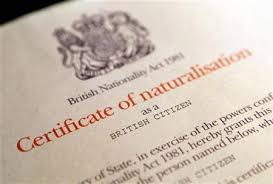Requirements for Naturalisation

A person is eligible to meet the main requirements for obtaining British nationality and citizenship through naturalisation if he or she either:
- has had no immigration restrictions for 12 months and has resided lawfully in the UK for at least 5 years, before the application, or,
- is married to a British citizen and has no immigration restrictions and has resided lawfully in the UK for at least 3 years before the application, or,
- has served the UK government, such as in the British Army, Royal Air Force or Royal Navy, for at least 3 years before the application, potentially with little or no residence in the UK.
A person is “free of immigration restrictions” if he or she has “indefinite leave to remain”, “permanent residence” or “right of abode”.
Residence in the Isle of Man, Guernsey and Jersey counts as residence in the UK.
There are strict limits on physical absences from the UK for naturalisation reliant on residence, normally 90 days per year.
Complete our cost-effective Naturalisation eligibility assessment. The Home Office application fee is significant and is non-refundable. Let us minimise your risk of a refusal and financial loss.
It might be cheaper and quicker to claim British citizenship and nationality by ancestry - you may not even know that you have a valid claim!
Passportia - British Citizenship Specialists
An adult person who has lawfully resided in the UK or a British territory, or served its government, may apply to become a British citizen by naturalisation. No ancestral or other previous links with the UK are required.
Passportia can find out if you qualify, and then prepare a legal opinion to get you a British Passport with the best possible chances and least hassle.
As part of our representation, you will be issued with a personalised document checklist, and we will guide you through your application process. Following the decision by the relevant government department, you would receive your citizenship certificate and/or passport.
Good character requirement
Naturalisation has a good character requirement. A person who has in the 10 years before the application has been declared bankrupt, has had a criminal conviction or has a criminal charge pending, has been the subject of a civil action (lawsuit), who has not paid tax due or has resided in the UK unlawfully for more than 3 weeks, may fail the good character test. The policies on good character are complex and allow for exceptions, and have been much stricter since January 2015.
European citizens and 'permanent residence'
Applications from citizens of EEA countries are now examined by the Home Office much more carefully. An EEA citizen automatically acquires Permanent Residence after exercising treaty rights for 5 years, such as employment, self-employment, study with comprehensive sickness insurance, etc. If an EEA citizen is relying on Permanent Residence in a naturalisation application but does not hold a Permanent Residence Card, then the Home Office expects to see evidence of work, self-employment or study, and where applicable sickness insurance, etc. for the whole 5 year period. Gaps in evidence make it difficult to demonstrate that Permanent Residence was acquired. There are arguments that we can use to address gaps.
Our naturalisation services
- We check whether you need naturalisation (you may already be a British citizen or have an easier or cheaper route to British citizenship via registration),
-
We carefully check that you qualify so that you do not waste the non-refundable Home Office fee (£1330 per application!)
- We check if you are exempt from the Life in the UK Test or English language test and if not provide detailed advice on how to satisfy these tests,
- We will help find, check and select the documentary evidence for the application.
- We supplement your application with a letter of representation demonstrating that you meet all the requirements and addressing any issues such as character or missing evidence.
If you have any issues concerning your past that feel may affect your application, we will advise you on whether you could or should apply, and how to present the application so as to maximise success and avoid potential issues in the future.
Children aged less than 18 years
A person aged under 18 years cannot be naturalised but an application for registration may be made – see registration. Registration of a child is generally easier after a parent has become a British citizen. There are over 15 routes to the registration of a minor child, some of which are obscure. Our system seeks looks for a solution.
Registration Alternatives
A person who was born in the UK or a British territory, or whose parent was a British citizen at his or her birth, or who is a British national (but not a British citizen), might be a be eligible for British citizenship by registration, which is a usually a cheaper and easier process than naturalisation – see registration.
How the British Home Office Works
The correct application forms, correct supporting documents and fee must be submitted together to the Home Office. Application decisions are normally based on the documents originally supplied with the application, so preparation and presentation of information and arguments are crucial to success. Once the information has been supplied, it cannot easily be changed or withdrawn. If your application is refused, the application fee will not be refunded.
Passportia is a specialist citizenship advice firm independent of the UK government and regulated by the Office of Immigration Advice Authority. Legal advice on how to demonstrate and substantiate a claim to citizenship cannot be obtained from the government.
Our success rate for citizenship claims is over 95. Please view the many testimonials from satisfied clients.
Find out if you can get a British passport by completing the form below!
PASSPORTIA IS
- A PRIVATE NON-GOVERNMENT ENTITY
- A UK immigration & citizenship law specialist
- Powered by AORA technology
- Fast, flexible, precise
- Regulated by the IAA of the UK to advise on if you can become a British citizen - GOV.UK
- Search for Passportia on the IAA Advisor Register
|
|
Jamal Mohammed Immigration Adviser |





 Regulated by the Immigration Advice Authority (IAA) Level 2, reference number F201300772
Regulated by the Immigration Advice Authority (IAA) Level 2, reference number F201300772